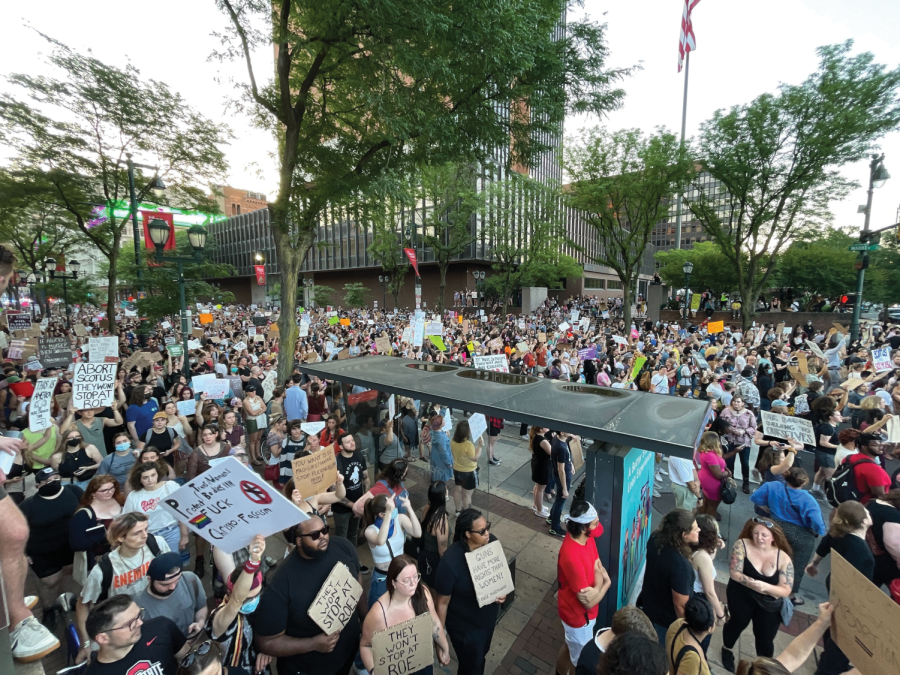In defense of Dobbs v. Jackson
After 5-4 vote Dobbs v. Jackson, Roe v. Wade was overturned, ending a 50 year precedented federal protection of abortion rights. Many went out on the streets after the decision to protest against the ruling, and many continue to fight for abortion today.
Aug 29, 2022
In a summer of controversial decisions, laws and resolutions, perhaps none were as controversial as the Supreme Court’s decision to overturn Roe w. Wade in the case Dobbs v. Jackson Women’s Health Organization.
Part of this controversy was because of the misconceptions about the case. Many people only knew that Roe v. Wade, which guaranteed national abortion rights in 1973, had been overturned. Their impression was that overturning Roe v. Wade would ban abortion in all fifty states. However, the decision instead returned that control to each state. So, while some states banned or limited abortion, others kept their laws in place.
This was still controversial, as women in states where abortion is banned or severely limited now may have to travel to another state if they want an abortion. Neither side may be completely satisfied, as pro-choice advocates may wish for further blocking of abortions. However, the overturning of Roe v. Wade is still a victory for pro-life advocates. So, was Dobbs v. Jackson the correct ruling?
The first issue people point out with Dobbs v. Jackson is that is overturned a precedent in Roe v. Wade that was reaffirmed in Casey v. Planned Parenthood in 1992. The Supreme Court rarely overturns precedent, in a process called stare decisis. However, the Constitution Annotated estimates that about 232 precedents have been overturned by the Supreme Court. So, while rare, the Supreme Court can overturn precedents. A famous example is the case Brown v. Board of Education of Topeka, which overturned a case allowing segregation of education based on race. It overturned a bad precedent. So, the question then becomes, was Roe v. Wade a good or bad precedent?
The constitutional premise of Roe v. Wade was there is a right to privacy in the Fourteenth Amendment which protects the right to an abortion. Ironically, the Fourteenth Amendment, which does not mention the words “private” or “privacy” in any place, does have this statement, “…nor shall any State deprive any person of life, liberty, or property, without due process of law…” The ruling that the phrase “due process” granted the right to privacy was considered controversial at the time. Some supporters of abortion rights agreed with the decision, but felt that the chief argument should have been based on the Ninth Amendment instead, which states that, “The enumeration in the Constitution, of certain rights, shall not be construed to deny or disparage others retained by the people.” In other words, while some rights were expressly stated in the Constitution, people have other rights which are implied though not specifically mentioned. So, since abortion is not an enumerated right, it is fair to question whether or not Roe v. Wade was a good ruling by declaring abortion as an implied right.
The question that nearly the entire abortion debate boils down to is simply this: what are the unborn? Nearly all arguments for the pro-life side assume the unborn is a person, who deserves basic human rights, including the right to life. Nearly all arguments for the pro-choice assume the unborn is a fetus or a potential burden upon the mother. The reason that this is a fundamental question is that if the unborn is a person, then using the Fourteenth Amendment was a defense for abortion would be a bad ruling, since it says a state cannot deprive any person of life without due process of law. Some might say the only applies to citizens of the United States, as this paragraph does speak about citizenship, but the Amendment uses person and citizen in different ways. The first sentence describes how a person becomes a citizen, illustrating that they are a person first. The phrase previous to the due process clause talks about how states cannot abridge a citizen’s privileges or immunities, but then says, “…nor shall any State deprive any person of life…” However, if the unborn is not a person before viability, then perhaps it makes sense to use the Fourteenth or Ninth Amendment to defend abortion.
What is the difference between a child just born, and one who is one day from birth? We would all consider the newborn baby a person, and yet there is no real difference between the baby not yet born and the newborn. If one is a person, the other should be as well. If the baby one day before birth is a person, what about the day before? Was it still a person? If you keep going back day by day, there is not enough difference to determine a point at which an unborn baby switched from a nonperson to a person. What about one week before the previous federal limit of viability and one week after? What has changed in the baby to go from a fetus whose mother’s rights to an abortion supersede its right to life to a person who a state can decide whether or not to protect?
There is an acronym used by pro-life supporters to shoot down many of the main arguments by pro-choice supporters. The acronym is SLED, and it stands for size, level of development, environment and degree of dependency. An unborn child is often smaller than a born child. However, a toddler is also often smaller than a teenager. Does that make the toddler any less of a person? If size shouldn’t be used to discriminate against a toddler, it should not be used against an unborn baby, either. An unborn child is less developed than a newborn, jst as a toddler is less developed than a teenager. If a toddler shouldn’t be killed based on their level of development, an unborn child shouldn’t either. An unborn child is in a different environment than a newborn. However, being in a different environment does not make an astronaut, deep-sea diver or pilot any less of a person. How does a baby moving through the birth canal into a different environment make it go from being a fetus to a person? Finally, an unborn baby is dependent on its mother for nutrition and survival. However, a newborn is also dependent on its mother. A toddler depends upon their parents for nutrition and a safe environment. The level of dependency does not give a reason to discriminate against an unborn child’s human rights.
The Dobbs v. Jackson case, though controversial, was the correct ruling in striking down a bad ruling that used judicial activism to create a previously unrecognized right using the Amendment the protects a person’s right to life.










Lindsey • Aug 30, 2022 at 6:13 pm
I am completely supportive of journalistic freedom and freedom of expression, however I feel this article was insensitive in its delivery and I’m incredibly disappointed in the way the Northern Iowan handled such a personal and sensitive subject. Doesn’t make me proud to be a UNI student.